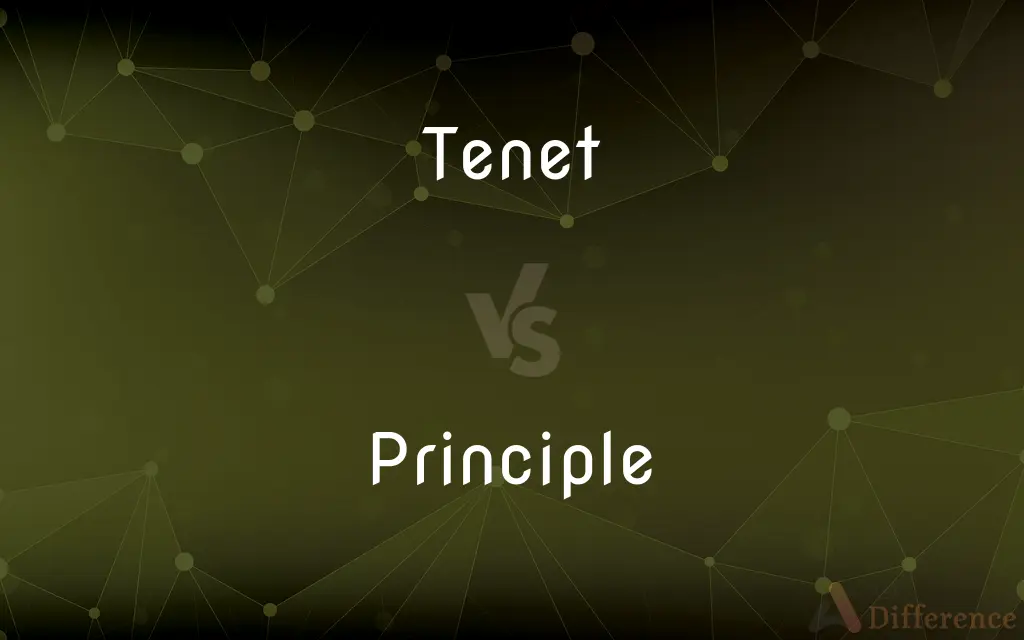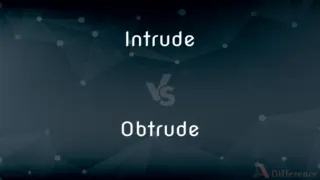Tenet vs. Principle — What's the Difference?
By Urooj Arif & Fiza Rafique — Updated on March 7, 2024
A tenet is a belief or doctrine accepted by members of a group, while a principle is a foundational truth or proposition that guides behavior or reasoning.

Difference Between Tenet and Principle
Table of Contents
ADVERTISEMENT
Key Differences
A tenet is often specific to a particular group, organization, or belief system, serving as a fundamental concept or belief that members adhere to. It is commonly used in religious, philosophical, or ideological contexts. On the other hand, a principle is a more general, foundational truth or law that serves as the basis for reasoning, behavior, or belief. Principles are often universal and can apply across various contexts and disciplines.
Tenets are typically more rigid and defined, often forming the basis of a structured belief system or ideology. They are accepted as truths by the members of the group and are used to guide actions and understanding within that specific context. Principles, however, are broader and can be seen as ethical guidelines or fundamental truths that inform personal conduct, professional practices, and moral judgments across different scenarios and cultures.
While tenets are often formally stated and adopted by specific groups, principles can emerge from personal experiences, cultural norms, or ethical reasoning. Principles are usually more flexible and open to interpretation, allowing individuals to apply them in diverse situations according to their understanding and judgment. In contrast, tenets may require adherence to a more prescribed interpretation or application.
The role of tenets is often to unify and identify a group or belief system, providing a clear set of guidelines or doctrines for its members. Principles, by contrast, serve to guide individual and collective behavior in a more open-ended way, promoting ethical conduct and decision-making based on fundamental truths or values.
In terms of application, tenets are often used to affirm membership in a group or adherence to a specific ideology, requiring a degree of commitment and agreement. Principles, on the other hand, influence personal and professional choices, guiding actions and decisions based on a broader set of ethical or moral values rather than the specific dictates of a particular group or belief system.
ADVERTISEMENT
Comparison Chart
Definition
A belief or doctrine accepted by members of a group
A foundational truth or proposition that guides behavior
Context
Specific to groups, religions, or ideologies
Universal, applicable across various contexts
Nature
More rigid and defined
Broader and more open to interpretation
Function
Unifies and identifies a group
Guides individual and collective behavior
Application
Requires adherence to specific interpretations
Influences choices based on ethical or moral values
Flexibility
Less flexible, often requiring formal acceptance
More flexible, allowing for personal interpretation
Compare with Definitions
Tenet
Religious Belief
The resurrection is a fundamental tenet of Christian faith.
Principle
Ethical Guideline
Honesty is a principle she upholds in all her dealings.
Tenet
Ideological Position
Equality is a key tenet of their political platform.
Principle
Moral Value
Respect for all living beings is a principle he lives by.
Tenet
Philosophical Concept
The idea of impermanence is an important tenet in Buddhist philosophy.
Principle
Foundational Truth
The principle of gravity explains why objects fall towards the Earth.
Tenet
Organizational Rule
Sustainability is a core tenet of the company's mission.
Principle
Behavioral Standard
The principle of fairness guides his decision-making process.
Tenet
Group Doctrine
Non-violence is a central tenet of their community.
Principle
Professional Practice
Confidentiality is a key principle in medical practice.
Tenet
A principle or belief, especially one of the main principles of a religion or philosophy
The tenets of classical liberalism
Principle
A principle is a proposition or value that is a guide for behavior or evaluation. In law, it is a rule that has to be or usually is to be followed.
Tenet
A doctrine, principle, or position held as part of a philosophy, religion, or field of endeavor.
Principle
A fundamental truth or proposition that serves as the foundation for a system of belief or behaviour or for a chain of reasoning
The basic principles of justice
Tenet
An opinion, belief, or principle that is held as absolute truth by someone or especially an organization.
Principle
A general scientific theorem or law that has numerous special applications across a wide field.
Tenet
Any opinion, principle, dogma, belief, or doctrine, which a person holds or maintains as true; as, the tenets of Plato or of Cicero.
That al animals of the land are in their kind in the sea, . . . is a tenet very questionable.
The religious tenets of his family he had early renounced with contempt.
Principle
A fundamental source or basis of something
The first principle of all things was water
Tenet
A religious doctrine that is proclaimed as true without proof
Principle
A basic truth, law, or assumption
The principles of democracy.
Principle
A rule or standard, especially of good behavior
A man of principle.
Principle
The collectivity of moral or ethical standards or judgments
A decision based on principle rather than expediency.
Principle
A fixed or predetermined policy or mode of action.
Principle
A basic or essential quality or element determining intrinsic nature or characteristic behavior
The principle of self-preservation.
Principle
A rule or law concerning the functioning of natural phenomena or mechanical processes
The principle of jet propulsion.
Principle
(Chemistry) One of the elements that compose a substance, especially one that gives some special quality or effect.
Principle
A basic source. See Usage Note at principal.
Principle
A fundamental assumption or guiding belief.
We need some sort of principles to reason from.
Principle
A rule used to choose among solutions to a problem.
The principle of least privilege holds that a process should only receive the permissions it needs.
Principle
Moral rule or aspect.
I don't doubt your principles.
You are clearly a person of principle.
It's the principle of the thing; I won't do business with someone I can't trust.
Principle
(physics) A rule or law of nature, or the basic idea on how the laws of nature are applied.
Bernoulli's Principle
The Pauli Exclusion Principle prevents two fermions from occupying the same state.
The principle of the internal combustion engine
Principle
A fundamental essence, particularly one producing a given quality.
Many believe that life is the result of some vital principle.
Principle
A source, or origin; that from which anything proceeds; fundamental substance or energy; primordial substance; ultimate element, or cause.
Principle
An original faculty or endowment.
Principle
(obsolete) A beginning.
Principle
(transitive) To equip with principles; to establish, or fix, in certain principles; to impress with any tenet or rule of conduct.
Principle
Beginning; commencement.
Doubting sad end of principle unsound.
Principle
A source, or origin; that from which anything proceeds; fundamental substance or energy; primordial substance; ultimate element, or cause.
The soul of man is an active principle.
Principle
An original faculty or endowment.
Nature in your principles hath set [benignity].
Those active principles whose direct and ultimate object is the communication either of enjoyment or suffering.
Principle
A fundamental truth; a comprehensive law or doctrine, from which others are derived, or on which others are founded; a general truth; an elementary proposition; a maxim; an axiom; a postulate.
Therefore, leaving the principles of the doctrine of Christ, let us go on unto perfection.
A good principle, not rightly understood, may prove as hurtful as a bad.
Principle
A settled rule of action; a governing law of conduct; an opinion or belief which exercises a directing influence on the life and behavior; a rule (usually, a right rule) of conduct consistently directing one's actions; as, a person of no principle.
All kinds of dishonesty destroy our pretenses to an honest principle of mind.
Principle
Any original inherent constituent which characterizes a substance, or gives it its essential properties, and which can usually be separated by analysis; - applied especially to drugs, plant extracts, etc.
Cathartine is the bitter, purgative principle of senna.
Principle
To equip with principles; to establish, or fix, in certain principles; to impress with any tenet, or rule of conduct, good or ill.
Governors should be well principled.
Let an enthusiast be principled that he or his teacher is inspired.
Principle
A basic generalization that is accepted as true and that can be used as a basis for reasoning or conduct;
Their principles of composition characterized all their works
Principle
A rule or standard especially of good behavior;
A man of principle
He will not violate his principles
Principle
A basic truth or law or assumption;
The principles of democracy
Principle
A rule or law concerning a natural phenomenon or the function of a complex system;
The principle of the conservation of mass
The principle of jet propulsion
The right-hand rule for inductive fields
Principle
Rule of personal conduct
Principle
(law) an explanation of the fundamental reasons (especially an explanation of the working of some device in terms of laws of nature);
The rationale for capital punishment
The principles of internal-combustion engines
Common Curiosities
Can tenets change over time?
Tenets can evolve or be reinterpreted, but they are generally more stable within the context of the groups that uphold them.
What is a principle?
A principle is a fundamental truth or proposition that serves as the foundation for a system of belief or behavior.
Are principles subjective or objective?
Principles can be seen as both subjective and objective, depending on whether they are based on personal beliefs or universal truths.
How do tenets influence behavior?
Tenets influence behavior by providing specific guidelines or doctrines that members of a group are expected to follow.
What is a tenet?
A tenet is a belief or doctrine that is accepted as true by members of a specific group or organization.
Are all principles ethical?
Most principles have an ethical component, as they often relate to fundamental notions of right and wrong.
Is it possible to have conflicting tenets?
Yes, different groups or belief systems can have tenets that conflict with each other.
Are tenets always religious?
While many tenets are associated with religious beliefs, they can also be part of secular ideologies or organizations.
Do principles apply to everyone?
While principles can be universal, their interpretation and application may vary among individuals and cultures.
How do principles affect decision-making?
Principles guide decision-making by providing a moral or ethical framework to evaluate choices and actions.
Do tenets require faith?
Tenets often require a degree of faith or belief in the doctrines of a particular group or ideology.
Can an individual have their own tenets?
Individuals can adopt tenets from various groups or belief systems, but tenets are typically associated with collective ideologies.
How are principles developed?
Principles can be developed through personal experiences, cultural norms, ethical reasoning, or philosophical inquiry.
Can principles be proven scientifically?
Some principles, especially those related to natural laws, can be scientifically proven, while ethical or moral principles are more subjective.
Can a principle become a tenet?
A principle can become a tenet if it is formally adopted and integrated into the belief system of a specific group.
Share Your Discovery

Previous Comparison
Intrude vs. Obtrude
Next Comparison
Impaired vs. DisturbedAuthor Spotlight
Written by
Urooj ArifUrooj is a skilled content writer at Ask Difference, known for her exceptional ability to simplify complex topics into engaging and informative content. With a passion for research and a flair for clear, concise writing, she consistently delivers articles that resonate with our diverse audience.
Co-written by
Fiza RafiqueFiza Rafique is a skilled content writer at AskDifference.com, where she meticulously refines and enhances written pieces. Drawing from her vast editorial expertise, Fiza ensures clarity, accuracy, and precision in every article. Passionate about language, she continually seeks to elevate the quality of content for readers worldwide.














































